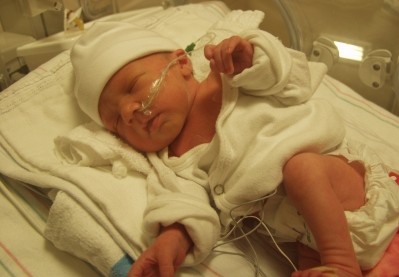Study: Maternal vitamin D deficiency could impair baby's cognitive development

Adequate levels of vitamin D in the prenatal period are essential for child development, yet there is a high prevalence of vitamin D insufficiency and deficiency (defined as <75 nmol/L and <50 nmol/L respectively) in pregnant and lactating women.
For infants, a lack of vitamin D during pregnancy has been associated with prematurity, low birth weight, cardiovascular disease risk factors, abnormal skeletal development, asthma, and neurocognitive development problems. Vitamin D therefore appears to play an important role in several neurodevelopment issues and to have certain neuroprotective factors but few studies have focused on these topics and and findings are not conclusive.
In the current study, researchers from Catalonia, Spain, assessed the association between vitamin D status during pregnancy and infant neurodevelopment (cognitive, language, and motor skills).
Their data was taken from the ECLIPSES study - a community randomised controlled trial (RCT) conducted in Tarragona (Catalonia, Spain) between 2013 and 2017. From an initial sample of 793 women (mean age 30.6) recruited before the 12th week of pregnancy, 422 mother–infant pairs were followed up to a postpartum visit. Vitamin D levels were assessed in the first and third trimesters of pregnancy, and socio-demographic, nutritional, and psychological variables were collected.
At 40 days postpartum, the Bayley Scales of Infant Development-III were administered to the infants and several obstetrical data were recorded.
The authors found that, independently from several confounding factors, deficient vitamin D levels in the first trimester of pregnancy (<30 nmol/L) predicted a worse performance in cognitive and language skills. Language performance worsened with lower vitamin D levels (<20 nmol/L). In the third trimester, this highly deficient level was also associated with lower motor skills.
The current report concludes: "The rates of pregnant women with suboptimal vitamin D levels are very high worldwide. In our sample this prevalence reached 50% in the first trimester (unpublished results) and 49.7% in the third (<30 nmol/L). In the first trimester roughly 22.8% of women had vitamin D deficiency below 20 nmol/L. In the third trimester this figure was 23.7%. In general, our results show that the offspring of mothers with normal prenatal vitamin D levels significantly improved their performance in cognitive, language, and motor skills.
"Hypovitaminosis D during pregnancy could therefore be an important public health concern with dire consequences for gestational course, the mother’s and child’s health, and the child’s development throughout their lifespan. Measuring vitamin D early in pregnancy could present an excellent opportunity to identify at-risk pregnancies in a timely fashion, thus providing ample time to monitor such pregnancies and offering early prophylaxis."
Hypothesising the reason for the link found, the authors note that early stages of gestation (first and second trimesters) are a critical period in the development of the foetal nervous system due to the beginning of neurogenesis and the myelination process and fetuses are dependent on their mothers’ vitamin D status.
The authors suggest this could be why low levels of this vitamin during this period may be closely related to the children’s neurodevelopment and why this effect on cognitive and language skills is not observed when the vitamin D deficiency occurs at the end of gestation.
They say more studies are needed both to clarify the precise role of vitamin D and to produce specific nutritional recommendations for pregnant women to follow to ensure the proper course of their pregnancy, optimal foetal brain development, and optimal neurodevelopment of their child throughout their lifespan.
Prior studies
A recent systematic review concluded that low prenatal vitamin D status was associated with adverse infant neurodevelopment in cognitive, language, and motor skills.
Janbek et al. concluded that an association exists between hypovitaminosis D during pregnancy and worse performance in expressive language that may even persist into adolescence. Adding to this, Whitehouse et al. observed that the offspring of Australian mothers with low vitamin D levels at the beginning of the second trimester (whether these levels were already low in the first trimester was unknown) were almost twice as likely to have more severe language impairment at five and ten years of age than those of mothers with high vitamin D levels (Odds Ratio (OR) = 1.97; 95%Confidence Interval (CI) = 1.00–3.93).
Darling et al. suggested that, as well as motor skills, deficient prenatal vitamin D status may also have adverse effects on certain social development measures in children under four.
In a Spanish population-based cohort study (INMA Project) conducted with 1820 mother–infant pairs, infants of mothers with higher circulating concentrations of 25(OH)D3 between the end of the first trimester and the beginning of the second trimester of pregnancy (>75 nmol/L) showed higher mental and psychomotor scores than those of mothers with lower concentrations (<50 nmol/L).
In line with the above research, Zou et al. recently observed a relationship between vitamin D in pregnancy and brain morphology in offspring. In a sample of 2597 preadolescents, the authors found that a higher maternal 25(OH)D3 concentration in mid-gestation was related to a larger cerebellar volume. Moreover, children exposed to a steadily deficient 25(OH)D3 concentration between this moment of pregnancy and delivery showed lower volumes of cerebral grey matter and white matter.
Source: Nutrients
Arija. V., et al
"Effect of Vitamin D Status during Pregnancy on Infant Neurodevelopment: The ECLIPSES Study"









